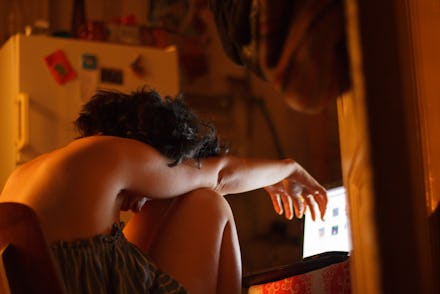Science Has Bad News for People Who Binge-Watch TV Shows

Burying yourself in blankets and wine while watching the entire new season of House of Cards may seem like a perfectly fine way to spend a weekend, but a new study from the University of Texas at Austin suggests something troubling: If you love binge-watching, you might be depressed.
The research: Researchers Yoon Hi Sung, Eun Yeon Kang and Wei-Na Lee decided to take a long, hard look at the causes and effects of binge-watching (a relatively new term defined by the Oxford dictionary as "[watching] multiple episodes of a television program in rapid succession") to see if our obsession with mainlining episodes of House of Cards and Orange Is the New Black is as harmless as we hope it is.
"It all started out with this word binge," Lee, a professor at UT-Austin, told Newsweek. "The word 'binge' has this negative connotation, [except when we're talking about watching TV]. That got us curious."
As it turns out, binge-watching has more in common with binge-eating and binge-drinking than one may think. Sung, Kang and Lee polled 316 young people between the ages of 18 and 29 on the frequency with which they watched TV, how often that was binge-watching and the regularity with which they experience feelings of "loneliness, depression and self-regulation deficiency."
The researchers found that depression and binge-watching were very much connected: The more lonely and depressed the participants were, the more likely they were to devour giant chunks of TV programming. Subjects most often used this activity to avoid negative feelings, which is behavior also favored by binge-eaters and binge-drinkers.
Correlation, not causation: Though the findings certainly don't give the Netflix fanatics among us much to feel good about, it's important to note that the findings merely represent a connection: Binge-watching Orange Is the New Black isn't necessarily going to make you depressed or lonely.
Lee herself added that the study was just the one of many forays into the study of new, technology-based behavior. "I feel like this is just exploratory research," she told NPR.
Part of the problem is defining the precise number of episodes needed to constitute binge-watching.
Sung, Kang and Lee determined that participants had engaged in such behavior when they consumed two or more episodes in the same sitting. But as Nolan Feeney wrote at the Atlantic last February, this measurement doesn't take time into account: Two episodes of Broad City take up about 40 minutes, which is the length of one hour-long show minus commercial breaks — but only the former counts as binge-watching.
In the end, Feeney came up with the following definition of binge-watching (emphasis ours):
binge-watch: (v) to watch at least four episodes of a television program, typically a drama, in one sitting (bathroom breaks and quick kitchen snack runs excepted) through an on-demand service or DVDs, often at the expense of other perceived responsibilities in a way that can cause guilt.
The last clause here, it seems, is key. While the researchers aren't yet ready to declare binge-watching our new national epidemic, they did emphasize that the behavior should be looked at with a careful eye.
"Even though some people argue that binge-watching is a harmless addiction, findings from our study suggest that binge-watching should no longer be viewed this way," Sung cautioned in a statement.
Sorry, folks: You may want to put that House of Cards binge on hold.